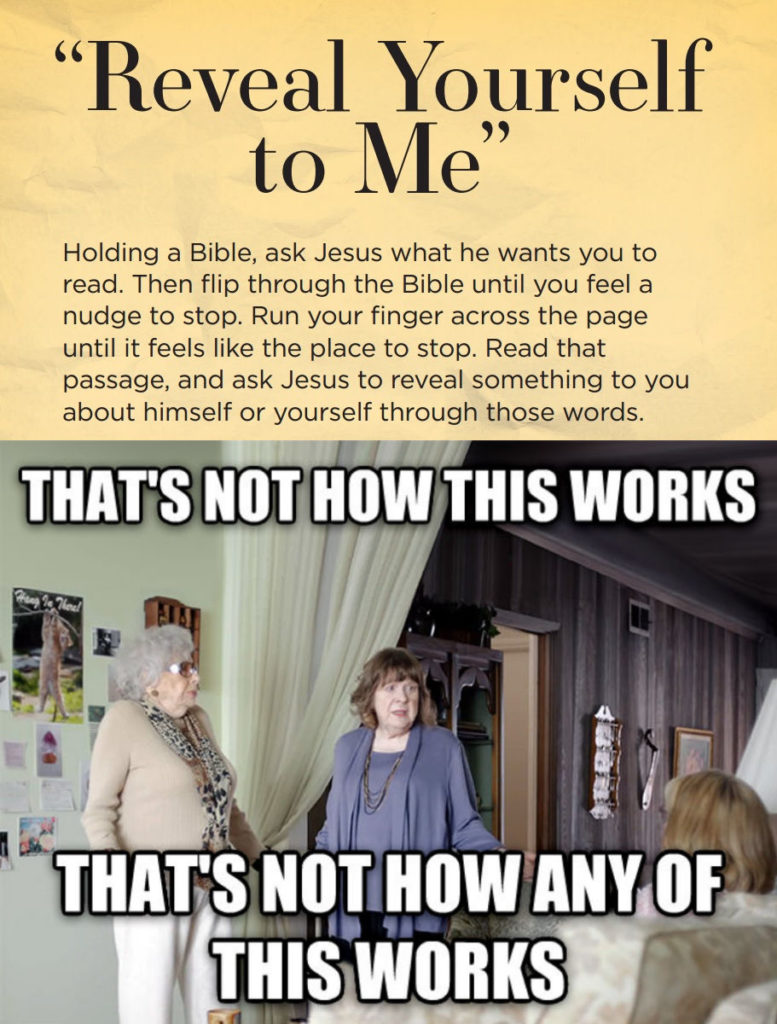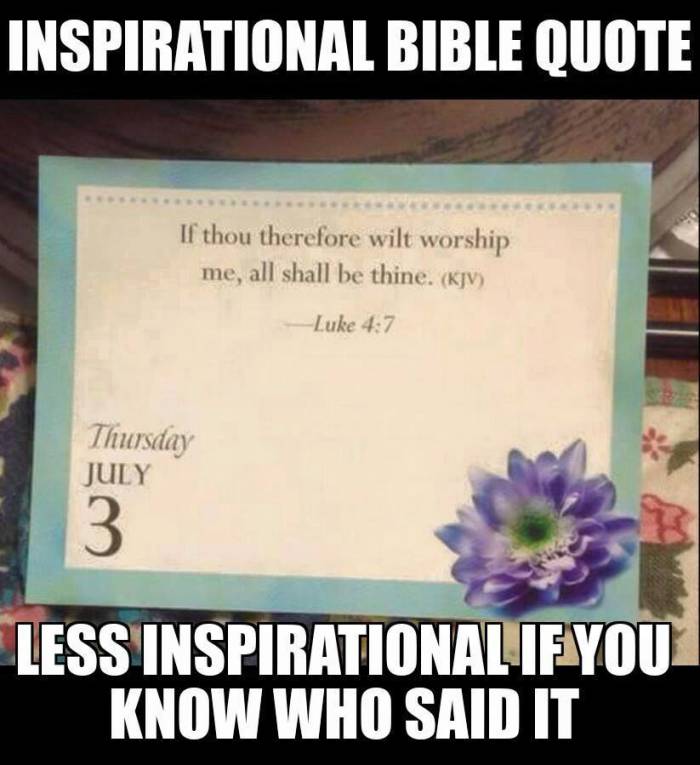Should we randomly open our Bible and ask God, “reveal yourself to me?” If we truly esteem God’s word, shouldn’t it be seen in our Bible study?
When I was 16 years old, I gave my life to Christ and was baptized. My new church family gave me a Bible as a gift for my commitment. I remember the morning one of the deacons handed it to me. My youth group friends, sitting together as we always did, feigned “oohs” and “aahs” over my gift and I played it up, displaying the crisp white pages.
Trust me, they were impressed.
Then, purely out of goofiness, I slipped my finger between a couple of pages and declared, “I’d like to read something that has meant a lot to me.” Tur
Completely random! We all got a great laugh out of it, and I learned the dangers of playing “pin the tail on the donkey” Bible study. It made me look like the donkey!
You know what I mean.
Feel Your Way Through the Bible
So, imagine my surprise when, thirty-some years later, in a professionally written discipleship/small group series, I found the following prompt for one session’s activities:

Mind you, this was from a reputable Bible curriculum publishing house. I’ve always found their material to be well-written and Scripturally responsible. But here, in the middle of a series that promised to develop disciples “the way Jesus did” they actually encouraged a superstitious method of Bible study. I’m hard-pressed to find any instance where Jesus treated the word of God as a magic book to summon your own meaning and message.
By the way, I hate to name names. I don’t really want to out the company that produced this material.
However, their name rhymes with “Broop.”
Broop Fublishing.
To Whom it May Concern,
I decided to send my concerns in an email to the fublisher . . . er . . . publisher. In part, I wrote, “I understand this isn’t a Bible study, it’s a ‘discipleship experience,’ but I would never encourage a disciple to use this Bible reading practice.” I thought I made a fair case for my concern.
Amazingly enough, within a day I had a response from a member of the creative team that produced the material. In his email, he explained,
The point we’re trying to make throughout the resource is that Jesus wants an active relationship with us, characterized by intimacy and the kind of back-and-forth interaction that infuses all deep relationships. This activity is designed to help people to learn how to depend on, and be guided by, the Spirit of Jesus in their life. This is a simple, playful way to risk and follow the “nudges” of the Spirit. If we’re to have a real relationship with Jesus, in real time, in real circumstances, we’ll need to “normalize” a dependence on His Spirit. That’s what we’re trying to do here.
But we’re totally not telling people the Bible is a magic book you can just stick your finger in and find a message just for you. This is something completely different. We’re trying to teach people to have “a real relationship with Jesus.”

So How Does It Work?
I should have known better, but I sent another reply. This time I included the story about my 16-year-old dumb self, poking my finger into my Bible and pulling out that plumb from Proverbs 30. Then I concluded.
There’s a difference between my goofiness and responsible reading of the word of God. Your prompt says to “flip through the Bible until you feel a nudge to stop.” Then, “run your finger across the page until it feels like a place to stop.” I’m not questioning the ability of God to speak to us in those random moments, but is it truly responsible Bible reading? I think about Jeremiah and the dark places he found himself in his life. Dark enough that he declared, “The heart is deceitful above all things, and desperately sick; who can understand it” (Jeremiah 12:9)? Are you truly ok with a person in a dark place like that randomly choosing a Bible verse and look for a personal message from Jesus? Can you guarantee the correct word every time this practice is performed?
The reality is, if you can’t guarantee consistent results, then this practice IS superstition. Would it not be better to teach disciples, as God calls from Isaiah 1:18, to “reason together” with the Lord? Or, as Paul encourages Timothy, to “rightly handle the word of truth” (2 Timothy 2:15)?
It was at this point I was given the “Thanks for your concern, but I’ve written real books. I know what I’m doing. Have a great day” response (I’m dumbing it down for all of you who haven’t written real books. You’re welcome).
A Real Relationship with Jesus
I know people who have tremendous love and respect for the Bible. They value the Scriptures and know that through them they “can be equipped for every good work” (2 Timothy 3:17). And yet, at the same time, they will treat a “Verse-A-Day Calendar” like some kind of holy fortune cookie, flipping another page to find the exact guidance needed for that day. Yet, the very book they esteem so highly never does that!

Instead, we find the apostles devoting themselves (together) to the ministry of the word (Acts 6:4). We read of the nobility of the Bereans, who “received the word with all eagerness, examining the Scriptures daily” (Acts 17:11). We hear Peter’s warning that “no prophecy of Scripture comes from someone’s own interpretation” (2 Peter 1:20). Rather, something great happens when the community opens their Bibles together.
Reveal Yourself to Me . . . to Us
As Pete Enns states in one of his articles, “I love the Bible because it forces me to reflect on God in community with others.” The community that gathered around my 16-year-old self that day when I declared, “I am the most ignorant of men,” was laughing with me (ok . . . and at me) because we knew that’s not how the Bible worked. We knew God wasn’t revealing himself to me. Rather, I was revealing myself to be a goofball.
Real discipleship might start with a goofball, but it should end with a goofball in community; approaching the word of God responsibly, and hearing it together. Again and again, in Scripture, we see that God’s favorite way to reveal himself to us is through the people nearest to us.
Now that’s a discipleship experience!

Thanks, Bret. We’ll done and enlightening.
Thank you, Bryan. I appreciate you taking the time to read and respond.